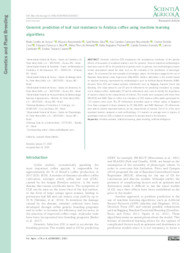Genomic prediction of leaf rust resistance to Arabica coffee using machine learning algorithms.
Genomic prediction of leaf rust resistance to Arabica coffee using machine learning algorithms.
Author(s): SOUSA, I. C. de; NASCIMENTO, M.; SILVA, G. N.; NASCIMENTO, A. C. C.; CRUZ, C. D.; SILVA, F. F. e; ALMEIDA, D. P. de; PESTANA, K. N.; AZEVEDO, C. F.; ZAMBOLIM, L.; CAIXETA, E. T.
Summary: Genomic selection (GS) emphasizes the simultaneous prediction of the genetic effects of thousands of scattered markers over the genome. Several statistical methodologies have been used in GS for the prediction of genetic merit. In general, such methodologies require certain assumptions about the data, such as the normality of the distribution of phenotypic values. To circumvent the non-normality of phenotypic values, the literature suggests the use of Bayesian Generalized Linear Regression (GBLASSO). Another alternative is the models based on machine learning, represented by methodologies such as Artificial Neural Networks (ANN), Decision Trees (DT) and related possible refinements such as Bagging, Random Forest and Boosting. This study aimed to use DT and its refinements for predicting resistance to orange rust in Arabica coffee. Additionally, DT and its refinements were used to identify the importance of markers related to the characteristic of interest. The results were compared with those from GBLASSO and ANN. Data on coffee rust resistance of 245 Arabica coffee plants genotyped for 137 markers were used. The DT refinements presented equal or inferior values of Apparent Error Rate compared to those obtained by DT, GBLASSO, and ANN. Moreover, DT refinements were able to identify important markers for the characteristic of interest. Out of 14 of the most important markers analyzed in each methodology, 9.3 markers on average were in regions of quantitative trait loci (QTLs) related to resistance to disease listed in the literature.
Publication year: 2021
Types of publication: Journal article
Unit: Embrapa Coffee
Observation
Some of Embrapa's publications are published as ePub files. To read them, use or download one of the following free software options to your computer or mobile device. Android: Google Play Books; IOS: iBooks; Windows and Linux: Calibre.
Access other publications
Access the Agricultural Research Database (BDPA) to consult Embrapa's full library collection and records.
Visit Embrapa Bookstore to purchase books and other publications sold by Embrapa.

